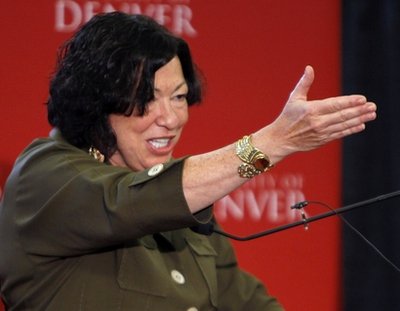Kurt Nimmo
Infowars.com
August 28, 2010
Infowars.com
August 28, 2010
On Thursday, talking to students at the University of Denver, Supreme Court Justice Sonia Sotomayor said the Wikileaks case will result in the Court likely weighing the First Amendment against national security. She made the comment in response to a question posed by a student.
 | |
| Sotomayor made her comments about the First Amendment at the University of Denver on Thursday. | |
“That was not the beginning of that question, but an issue that keeps arising from generation to generation, of how far we will permit government restriction on freedom of speech in favor of protection of the country,” Sotomayor said. “There’s no black-and-white line.” According to Sotomayor, the balance between national security and free speech is “a constant struggle in this society, between our security needs and our first amendment rights, and one that has existed throughout our history.”
Following the release of over 90,000 documents by Wikileaks in July, the Pentagon found no evidence that the disclosure harmed U.S. national security or endangered American troops in the field. The Pentagon review team consists of military intelligence analysts, lawyers and others working for the Joint Chiefs of Staffs and other elements of the Defense Department.
The Obama administration and certain members of Congress, however, have portrayed the release as a dire threat to national security. Obama asked Britain, Germany, Australia, and other allies to consider criminal charges against Wikileaks founder Julian Assange. Defense Secretary Robert Gates said the organization is guilty of “moral culpability” in the murder of U.S. soldiers. The ranking Republican on the House Homeland Security Committee, Rep. Peter King, said the release of documents violates espionage laws and amounts to treason. The FBI is investigating and the Justice Department said it was looking into pursuing criminal charges in the case. Rep. Mike Rogers, a Michigan Republican, has demanded the death penalty for SPC Bradley Manning, the man arrested and charged with providing the documents to Wikileaks.
Julian Assange had contacted the White House prior to releasing the documents and the New York Times acted as an intermediary. Wikileaks wanted to give the government a chance to make sure innocent people were identified, but the White House did not respond to the offer. The Times, Britain’s The Guardian, and the German weekly Der Spiegel published selected Wikileaks documents without consulting the government.
Sotomayor’s comment is a warning that the Supreme Court may soon use the Wikileaks case restrict the First Amendment. In the United States, the corporate media did not report on her comments, with the notable exception of the Associated Press.
Prior to her comments, Sen. Charles Schumer and Sen. Dianne Feinstein said the Free Flow of Information Act may need to be modified in response to Wikileaks. The senators want to change the language to specify that Wikileaks and organizations like it will not be able to use the act to protect the identities of confidential sources. Kurt Wimmer, an attorney representing the Newspaper Association of America, agreed with this exclusion. “There’s a distinction (between) how Wikileaks works and how news media organizations work,” he said and described Wikileaks as more of “a drop box for leaked documents” than a legitimate news source.
As the government prepares to roll back the First Amendment under the rubric of national security, we should consider the words of Hugo Black, considered one of the most influential Supreme Court justices in the 20th century, who said the following in the Pentagon Papers case:
In the First Amendment, the Founding Fathers gave the free press the protection it must have to fulfill its essential role in our democracy. The press was to serve the governed, not the governors. The Government’s power to censor the press was abolished so that the press would remain forever free to censure the Government. The press was protected so that it could bare the secrets of government and inform the people. Only a free and unrestrained press can effectively expose deception in government. And paramount among the responsibilities of a free press is the duty to prevent any part of the government from deceiving the people and sending them off to distant lands to die of foreign fevers and foreign shot and shell. (Emphasis added.)
Kurt Nimmo edits Infowars.com. He is the author of Another Day in the Empire: Life In Neoconservative America.
